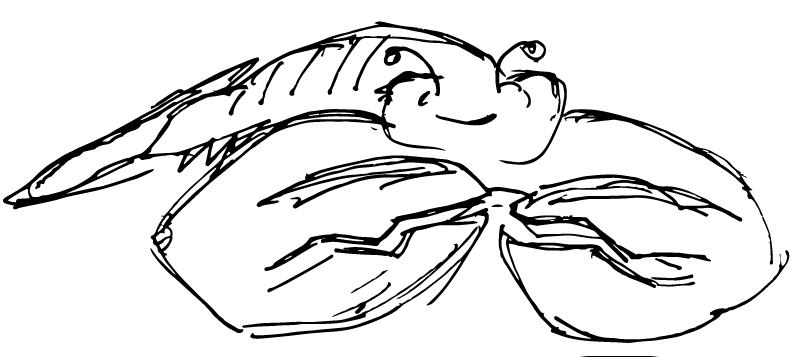https://github.com/schollz/crawdad
Cross-platform persistent and distributed web crawler :crab:
https://github.com/schollz/crawdad
crawler golang redis web
Last synced: 6 months ago
JSON representation
Cross-platform persistent and distributed web crawler :crab:
- Host: GitHub
- URL: https://github.com/schollz/crawdad
- Owner: schollz
- License: mit
- Created: 2017-06-20T01:06:15.000Z (over 8 years ago)
- Default Branch: master
- Last Pushed: 2019-05-10T02:22:28.000Z (over 6 years ago)
- Last Synced: 2025-03-29T14:11:23.896Z (7 months ago)
- Topics: crawler, golang, redis, web
- Language: Go
- Homepage: https://schollz.github.io/crawdad/
- Size: 7.82 MB
- Stars: 62
- Watchers: 7
- Forks: 9
- Open Issues: 1
-
Metadata Files:
- Readme: README.md
- License: LICENSE
Awesome Lists containing this project
README

crawdad


crawdad is cross-platform web-crawler that can also pinch data. crawdad is persistent, distributed, and fast. It uses a queue stored in a remote Redis database to persist after interruptions and also synchronize distributed instances. Data extraction can be specified by the simple and powerful pluck syntax.
Crawl responsibly.
For a tutorial on how to use *crawdad* see [my blog post](https://schollz.github.io/crawdad/).
# Features
- Written in Go
- [Cross-platform releases](https://github.com/schollz/crawdad/releases/latest)
- Persistent (interruptions can be re-initialized)
- Distributed (multiple crawdads can be run on diferent machines)
- Scraping using [*pluck*](https://github.com/schollz/pluck)
- Uses connection pools for lower latency
- Uses threads for maximum parallelism
# Install
First [get Docker CE](https://www.docker.com/community-edition). This will make installing Redis a snap.
Then, if you have Go installed, just do
```
$ go get github.com/schollz/crawdad
```
Otherwise, use the releases and [download crawdad](https://github.com/schollz/crawdad/releases/latest).
# Run
First run Redis:
```sh
$ docker run -d -v `pwd`:/data -p 6379:6379 redis
```
which will store the database in the current directory.
## Crawling
By "crawling* the *crawdad* will follow every link that corresponds to the base URL. This is useful for generating sitemaps.
Startup *crawdad* with the base URL:
```sh
$ crawdad -set -url https://rpiai.com
```
This command will set the base URL to crawl as `https://rpiai.com`. You can run *crawdad* on a different machine without setting these parameters again. E.g., on computer 2 you can run:
```sh
$ crawdad -server X.X.X.X
```
where `X.X.X.X` is the IP address of computer 2. This crawdad will now run with whatever parameters set from the first one. If you need to re-set parameters, just use `-set` to specify them again.
Each machine running *crawdad* will help to crawl the respective website and add collected links to a universal queue in the server. The current state of the crawler is saved. If the crawler is interrupted, you can simply run the command again and it will restart from the last state.
When done you can dump all the links:
```sh
$ crawdad -dump dump.txt
```
which will connect to Redis and dump all the links to-do, doing, done, and trashed.
## Pinching
By "pinching" the *crawdad* will follow the specified links and extract data from each URL that can be dumped later.
You will need to make a [*pluck* TOML configuration file](https://github.com/schollz/pluck). For instance, I would like to scrape from my site, rpiai.com, the meta description and the title. My configuration, `pluck.toml`, looks like:
```toml
[[pluck]]
name = "description"
activators = ["meta","name","description",'content="']
deactivator = '"'
limit = 1
[[pluck]]
name = "title"
activators = [""]
deactivator = ""
limit = 1
```
Now I can crawl the site the same way as before, but load in this *pluck* configuration with `--pluck` so it captures the content:
```sh
$ crawdad -set -url "https://rpiai.com" -pluck pluck.toml
```
To retrieve the data, then you can use the `-done` flag to collect a JSON map of all the plucked data.
```sh
$ crawdad -done data.json
```
This data JSON file will contain each URL as a key and a JSON string of the finished data that contain keys for the description and the title.
```sh
$ cat data.json | grep why
"https://rpiai.com/why-i-made-a-book-recommendation-service/index.html": "{\"description\":\"Why I made a book recommendation service from scratch: basically I found that all other book suggestions lacked so I made something that actually worked.\",\"title\":\"What book is similar to Weaveworld by Clive Barker?\"}"
```
# Advanced usage
There are lots of other options:
```
--server value, -s value address for Redis server (default: "localhost")
--port value, -p value port for Redis server (default: "6379")
--url value, -u value set base URL to crawl
--exclude value, -e value set comma-delimted phrases that must NOT be in URL
--include value, -i value set comma-delimted phrases that must be in URL
--seed file file with URLs to add to queue
--pluck value set config file for a plucker (see github.com/schollz/pluck)
--stats X Print stats every X seconds (default: 1)
--connections value, -c value number of connections to use (default: 25)
--workers value, -w value number of connections to use (default: 8)
--verbose turn on logging
--proxy use tor proxy
--set set options across crawdads
--dump file dump all the keys to file
--done file dump the map of the done things file
--useragent useragent set the specified useragent
--redo move items from 'doing' to 'todo'
--query allow query parameters in URL
--hash allow hashes in URL
--no-follow do not follow links (useful with -seed)
--errors value maximum number of errors before exiting (default: 10)
--help, -h show help
--version, -v print the version
```
# Dev
To run tests
```
$ docker run -d -v `pwd`:/data -p 6377:6379 redis
$ cd src && go test -v -cover
```
# License
MIT